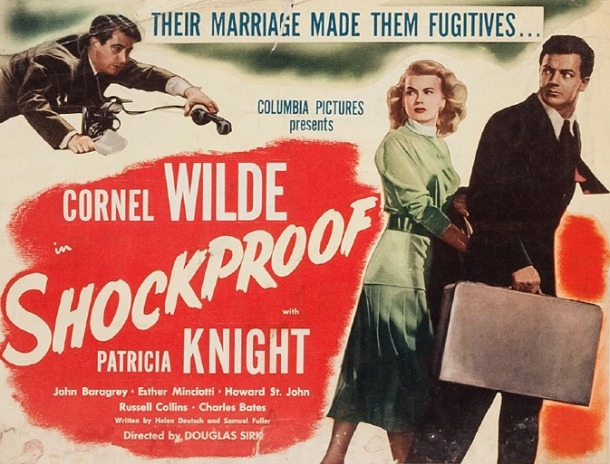
Shockproof (1949)
Directed by Douglas Sirk
Columbia Pictures
This review originally appeared earlier this year at Film Noir of the Week.
Real-life married couples can have strange chemistry when they appear together in a film. For every Bogie and Bacall there’s also a Cruise and Kidman. Just because two actors want to tie the knot and spend the rest of their lives together (or in most cases, several years of their lives together before separating), it doesn’t mean their real-life chemistry will translate to the big screen.
When Patricia Knight and Cornel Wilde starred together in Shockproof, they had been married 11 years. It was the only film they made together.
In Shockproof, Knight plays a woman named Jenny Marsh who has been paroled after a five-year stint in prison for murder. She committed the murder to protect her lover, Harry Wesson (John Baragrey). Jenny grew up in poverty, neglected by her parents, and the smooth-talking, wealthy Wesson swept her off her feet. The problem is, he’s a criminal through and through.
Jenny’s parole officer, Griff Marat (Wilde), believes that all she needs is to spend time with normal, decent people, and she’ll straighten out her life. Griff is a “hands-on” parole officer, and he nominates himself (along with his mother and adorable kid brother) as the most suitable decent people for Jenny to spend time with, and his romantic notions carry the force of the law.
As an actor, Wilde’s line delivery was never as impressive as his physique, but in his scenes with Knight he still comes off as the more seasoned thespian. Knight’s face is lovely in an angular sort of way, but her performance is the stuff of high camp. Whatever sparks existed in their real-life relationship, they’re hard to see in Shockproof.
Shockproof was also an intersection for two men whose best work lay ahead of them: Samuel Fuller and Douglas Sirk.
Sirk, the director of Shockproof, was born in Europe and made several films there before immigrating to the U.S. in 1941. He would go on to direct some of the most acclaimed American films of all time — the lush Technicolor melodramas Magnificent Obsession (1954), All That Heaven Allows (1955), Written on the Wind (1956), and Imitation of Life (1959) (which, to be technically nitpicky, was filmed in Eastmancolor, not Technicolor).
At the time he made Shockproof, however, his Hollywood filmography amounted to a number of well-made potboilers that had a gloss of European sophistication; Hitler’s Madman (1943), Summer Storm (1944), A Scandal in Paris (1946), The Strange Woman (1946) (The Strange Woman was directed by Edgar G. Ulmer, but Sirk also did some uncredited directorial work on the film), Lured (1947), and Sleep, My Love (1948).
Samuel Fuller, the screenwriter of Shockproof, was a newspaperman (he got his start as a copy boy at the age of 12), a pulp novelist, a screenwriter, a ghostwriter, and a veteran of World War II who had served with the 16th Infantry Regiment, 1st Infantry Division. Fuller would go on to become an acclaimed screenwriter and director of cult films like Pickup on South Street (1953), Shock Corridor (1963), and The Naked Kiss (1964).
Shockproof is the only collaboration between Sirk and Fuller. Fuller’s screenplay was originally called The Lovers, and it told the story of a man and woman doomed by their love for each other.
Fuller’s screenplay for The Lovers was the film Sirk signed on to make, but it wasn’t the film that ended up being released into theaters. Co-producer Helen Deutsch rewrote the script and tacked on a ridiculous happy ending. (If you’re a connoisseur of trashy cinema, Deutsch’s best work also lay ahead of her, since her last film credit was the screenplay for Valley of the Dolls, which she co-wrote with Dorothy Kingsley.)
Deutsch’s rewrite makes the entire film feel pointless, since it undercuts all of the ethical lines that Griff crosses because of his love for Jenny. It also neuters any sense of doom or tragedy that was present in Fuller’s original script. Even the change of title from The Lovers to Shockproof feels wrong. The term “The Lovers” recurs throughout the film, and it’s what Griff and Jenny are dubbed by the tabloid press. What does “Shockproof” even mean in the context of this film?
Even though Sirk and Fuller never met, Shockproof has Fuller’s fingerprints all over it. It’s a choppy, uneven film, but like everything that Fuller wrote, there’s a nasty passion always bubbling beneath the surface. It doesn’t matter so much why people are doing things, just that they’re doing them and going for broke, pedal to the metal, damned and proud, racing toward oblivion.
Of course, to pull this off successfully a film needs to have actors who are utterly convincing no matter how contrived their actions are, as well as a script that has the courage of its convictions. Unfortunately, Shockproof has neither of these things, and while there is much that’s good about it, ultimately it’s an interesting failure.

